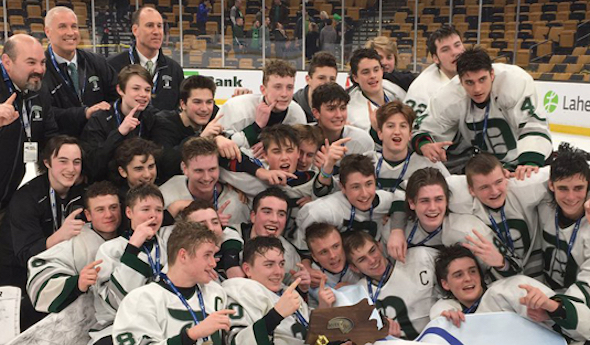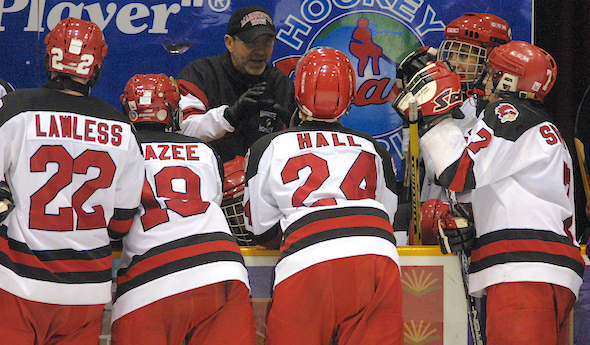
Title Time Differs Among Hockey States
July 12, 2019
By Rob Kaminski
MHSAA benchmarks editor
Next season’s three-week playoff format for the MHSAA Ice Hockey Tournament will fall more closely in line with similar postseasons for state associations around the country which sponsor the sport.
According to 2017-18 National Federation of State High School Associations participation statistics, 18 states sponsor boys ice hockey.
Michigan ranked third in number of schools involved with 240, behind Minnesota (282) and Massachusetts (278). In terms of overall participants, the MHSAA was fourth with 3,353, trailing Massachusetts (7,377), Minnesota (5,751) and New Jersey (3,492) and just ahead of New York (3,088). Wisconsin and Ohio boast more than 2,000 participants annually.
So, how do the tournaments compare among those states similar to Michigan? Most use longer tournament calendars than the two-week span previously employed by the MHSAA.
The timeframe for the season just past in the Minnesota tournament had most play beginning Feb. 21 and ending the same day as the MHSAA Finals, March 9. Some teams started on Feb. 19. The MHSAA dropped the puck for its first games on Monday, Feb. 25. It should be noted that Minnesota crowns just two champions annually, compared to the MHSAA’s three divisions.
Meanwhile, in Wisconsin and Ohio, just one school takes the statewide title each year, so it stands to reason that the postseason is spread out even further. Both states began the 2019 playoffs on Monday, Feb. 11.
Wisconsin’s tourney culminated on March 2 at Veteran’s Memorial Coliseum in Madison as teams played the Quarterfinals, Semifinals and Final over three consecutive days.
Ohio, meanwhile, took a week-long break following District Finals on March 1 or 2, then played the Semifinals and Final at Nationwide Arena in Columbus during March 8-9. This is similar to the rest period the MHSAA will enjoy moving forward from its Quarterfinals to the Semifinals and Finals in 2020.
Just as the season was reaching its pinnacle in Wisconsin, the postseason title chase was merely beginning in Massachusetts, where this year it opened Feb. 25.
Massachusetts is tied for the most divisions of the states studied here with four, but the top division is created with a different twist.
“The top division is often called the ‘Super 8’ or 1A. This tournament is set up differently than the other divisions,” said Massachusetts Ice Hockey Coaches Association President Dan Connolly. “The Super 8 is a double-elimination tournament. The seedlings for this tournament are done by power seeding via a committee using strength of schedule, record, team vs. teams under consideration and win-loss record down the stretch.”
Connolly said just 10 teams are chosen for the Super 8, and seed Nos. 7 through 10 must face off in a play-in game to join the top six. The two teams losing the play-in game return to their respective pre-assigned state divisions and can still win those tournaments. Such was the case in 2019, when Duxbury High lost in its bid to join the Super 8 field, but then won the Division 1 Final.
Like Michigan, those three divisions are based on enrollment, but unlike Michigan, the divisions are seeded based on winning percentage.
The Finals take place on a Sunday at the TD Garden in Boston, a celebration of hockey that features six games (four boys and two girls finals). This year’s event took place March 17, and nearly went into March 18. The Division 1 Final began at 9:59 p.m. as the previous contest, the Super 8 Final, went to four overtimes.
As mentioned, Minnesota’s tournament ended the same day as the MHSAA’s in 2019, and featured one overtime game among its two Finals at the Xcel Energy Center in St. Paul as Edina took the top class over Eden Prairie, 3-2.
The Sunday finales in Boston might seem foreign to followers of MHSAA tournaments, but New York also features a Sunday as the stage for its two state Finals, following Semifinals on Saturday. This year’s playoffs went from Feb. 20-March 10, culminating at the Harborcenter in Buffalo.
Neighboring New Jersey comes closest in length to the old MHSAA format with four divisions – three public and one non-public – taking just 14 days to determine winners at the Prudential Center in Newark. The 2019 titles were determined on Monday, March 4, with Semifinals the Wednesday prior.
PHOTO: Duxbury celebrated Massachusetts’ Division 1 championship this past season after missing out on making the “Super 8” bracket.

#TBT: 2002 Ends with Lights-Out Finals
July 12, 2019
By Rob Kaminski
MHSAA benchmarks editor
The Flint IMA had been to the MHSAA Ice Hockey Finals what Joe Louis Arena was to the Detroit Red Wings since it began hosting high school championships in the state in 1977.
For parts of four decades, the facility set the scene for many memorable moments on ice for scholastic skaters.
So it would have been fitting as the curtain was closing on an era March 9, 2002, if there’d been an overtime championship game or two to commemorate the last MHSAA Finals at the building.
In 2003, the MHSAA Semifinals and Finals would move to Compuware Arena in Plymouth – now USA Hockey Arena – where the event has been played ever since.
There would be no overtimes during the IMA’s swan song, but the arena wasn’t about to let go without a fight. Following the morning’s Division 2 Final, won by Grosse Pointe North over local qualifier Davison, things got strange.
As if by divine intervention, a significant power outage hit the Flint area between the first and second periods of the Division 3 Final, necessitating a return to the building for an encore performance that Monday.
Following is an account from then-MHSAA Assistant Director Randy Allen, administrator of the sport at that time.
 “East Grand Rapids and (Dearborn) Divine Child were between the first and second periods when the power went out at what must’ve been around three in the afternoon. Some of the house lights went on, but there was no huge generator. The power company told us it could be quite a while before the power came back, so the decision was made pretty quickly to come back Monday. (Editor’s Note: MHSAA regulations at that time prohibited Sunday competition, thus play would resume Monday)
“East Grand Rapids and (Dearborn) Divine Child were between the first and second periods when the power went out at what must’ve been around three in the afternoon. Some of the house lights went on, but there was no huge generator. The power company told us it could be quite a while before the power came back, so the decision was made pretty quickly to come back Monday. (Editor’s Note: MHSAA regulations at that time prohibited Sunday competition, thus play would resume Monday)
“Finishing the game in progress Monday was really a no-brainer, but now there were a couple of immediate challenges. First, how were we going to let people know, and second, what was going to happen to the (Detroit) Catholic Central-Marquette Division 1 game coming up later in the day?
“Well, knowing what I knew about the TV business (Allen’s background in Wisconsin included sportscasting), I grabbed one of the television reporters there, probably from Grand Rapids, and asked him to come down to the ice with me. It was totally dark; I figured once he put his camera lights on, it would get the attention of the crowd, which it did. So there’s about 2 or 3 thousand people in the arena – in the dark – and I’m standing in front of a light from a TV camera, and at the top of my voice I explain the situation and let them know we’re coming back Monday.
“Anyone wanting to come back, admission was free of charge, and we’d trust they were at the game. If they wanted a refund, they could mail their ticket stub to MHSAA and we'd send a refund. We obviously couldn’t use the box office without power. I don’t recall more than a couple dozen refund requests coming to our office later.
“Now the real challenge is the Division 1 game. Marquette very, very much wanted to go home and come back a week later. They’d been on the road all week (Marquette won a Quarterfinal in Traverse City that Wednesday). Jack (Roberts, former MHSAA executive director) was there, and he and Marquette’s AD (Scott Koski) and their superintendent debated a bit. In the end, the regulations of the day were upheld, and the game would be Monday.
“As it turned out, someone in the Marquette entourage had a contact in the Detroit Pistons front office, so the team was entertained in a suite at The Palace of Auburn Hills on Sunday night, so that was quite a happy ending from their standpoint.
“Many of the Marquette people were either in the arena or at a single hotel or two in the area, so alerting them to the change was not difficult.
“But then we started to think, ‘What about the Detroit CC people who would be driving up for their game later? Remember, social media was not as prevalent as it is today, or even the dependence on the internet.
“So, Saturday night, I sat there at the entrance to the IMA with my car running and lights on to inform the CC fans and anyone else who pulled up that the game had changed ... ‘Power’s out; game’s on Monday.’ They'd say thanks, and out they'd go. No one really got angry; there wasn’t anything anyone could do. I sat there an hour and a half with a steady stream, and shortly after the scheduled game time I called it a night.”
And, the IMA called it the end of an era, but not before hanging on for one more night, when Divine Child and Detroit CC would raise the last trophies in that building ... under the lights.
PHOTOS: (Top) Marquette was among teams that needed to stick around Flint two more days to play in the 2002 MHSAA Ice Hockey Finals. (Middle) Flint’s IMA arena.

